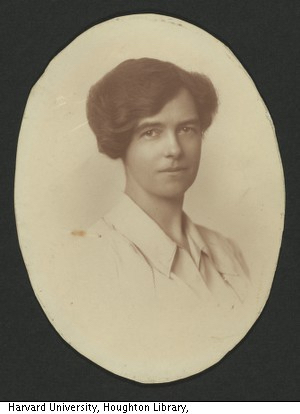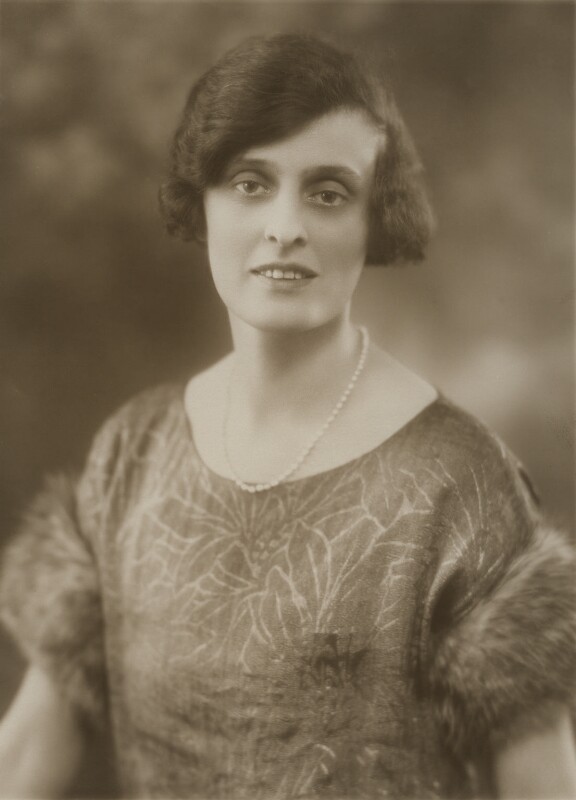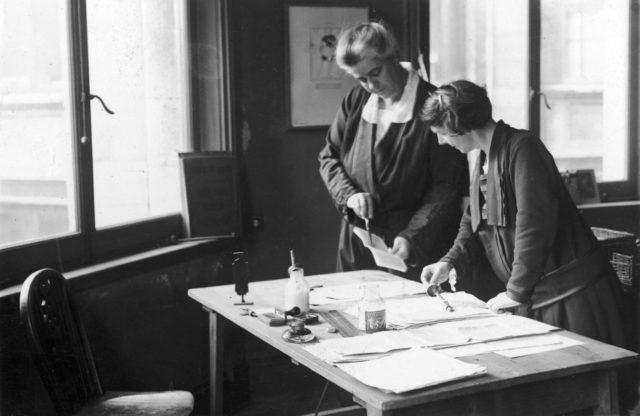
Cicely Hamilton led an extraordinary career as an actress, dramatist, novelist, journalist, travel writer, and active member of the women’s suffrage movement: to quote her ‘Personalities and Powers’ profile in Time and Tide, she was ‘a person of many facets’ (26 January 1923:83). She joined the magazine’s board of directors in 1921, and contributed signed articles and book reviews regularly throughout the interwar years. During the 1930s, she was instrumental in steering the magazine towards a more internationalist outlook.
(Mary) Cicely Hamilton (née Hammill) was born in London in 1872, to Maude and Denzil Hamill. She was educated at St Leonard’s boarding school in Malvern, and in Bad Homburg, Germany. She worked as a student teacher and then an actress, adopting Hamilton as her stage name. During the First World War, she worked as both an ambulance driver and an administrator, in a military hospital near Paris. Between 1917 and 1919 she performed for troops in France and Belgium, with a repertory company organised by feminist actress-manager Lena Ashwell. She continued to travel, and between 1931 and 1939 published nine books on contemporary Europe, the first of which, Modern Germanies as seen by an Englishwoman (1931), was developed from articles she published in Time and Tide.
Hamilton made an active, dedicated contribution to the women’s suffrage movement. In 1907 she joined the Women’s Freedom League, after its break with the Women’s Social and Political Union, editing its paper, The Vote. She was a co-founder of the Women Writers’ Suffrage League and an executive committee member of the Actresses’ Franchise League, and wrote the lyrics to the WSPU’s anthem, ‘The March of the Women’ (melody by Dame Ethel Smyth, a fellow member). Initially, Hamilton’s lyrics were published anonymously: she was revealed as their author in Time and Tide. Hamilton’s written work amplified her feminist views. Among her plays is How the Vote Was Won (1909), a one-act farce co-authored by her close friend Christopher St John (née Christabel Marshall, another regular contributor to Time and Tide, of music and theatre criticism, throughout the 1920s). In total, Hamilton wrote over twenty plays, half a dozen novels, including a suffrage novel, William an Englishman (1919), and Marriage as a Trade: a treatise expressing her convictions about the economic status in Edwardian society of women brought up and educated to become wives (1909). She supported herself through journalism, writing for newspapers including the Yorkshire Postand Manchester Guardian, and served on the editorial committee of pro-suffrage magazine The Englishwoman.
Hamilton remained committed to feminism beyond the suffrage movement’s partial victory in 1918. She joined the Six Point Group, remaining a member until the 1930s, and was a member of the Open Door Council (another equalitarian feminist organisation dedicated to women’s rights as workers) until her death; the causes she supported included birth control and the reform of abortion law. Hamilton joined Time and Tide’s board of directors in 1921 and was a regular contributor of signed articles, book reviews and other features throughout the interwar years. Her influence on Time and Tide is perhaps most evident in its internationalism. As Ann-Marie Einhaus has recently argued, her articles about Nazi Germany, drawing on an “intimate knowledge” of the country born of her schooling and subsequent travel, helped position Time and Tide as one of the most “outward-looking” journals of the 1930s. Cicely Hamilton was a close friend of Lady Rhondda, holidaying on the French Riviera with her and fellow directors Winifred Cullis and Winifred Holtby in 1928. She joined the magazine’s board in 1921, and became one of its longest serving directors, still recorded as a member during the mid 1940s. One of Time and Tide’s longest serving directors she is still recorded as a member during the mid-1940s. She died in 1952.
By Dr Eleanor Reed
Sources
https://www.oxforddnb.com/view/10.1093/ref:odnb/9780198614128.001.0001/odnb-9780198614128-e-38633
Clay, Catherine. Time and Tide: The Feminist and Cultural Politics of a Modern Magazine. Edinburgh University Press, Ltd, 2019 (2018)
Einhaus, Ann-Marie. ‘Wyndham Lewis, Cicely Hamilton and Nazi Germany in Time and Tide’ in Journal of Modern Periodical Studies, Vol. 10, No. 1, 2019
John, Angela V. Turning the Tide: The Life of Lady Rhondda. Parthian, 2013


